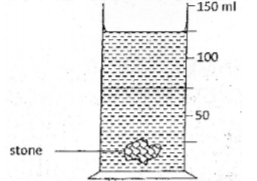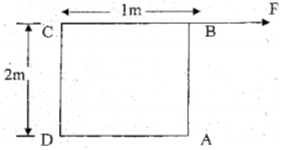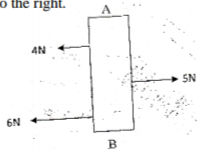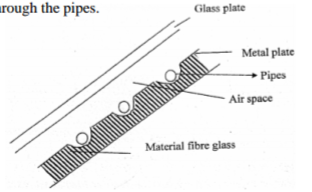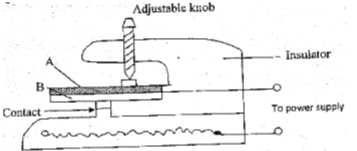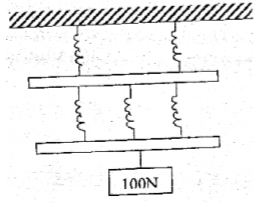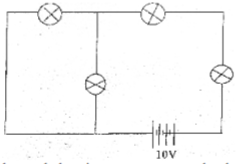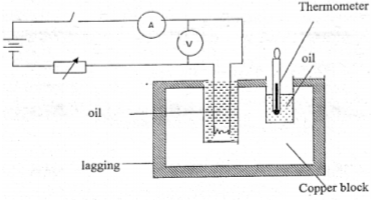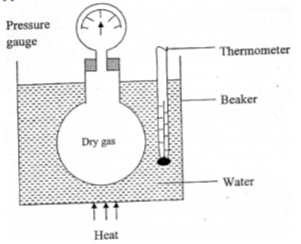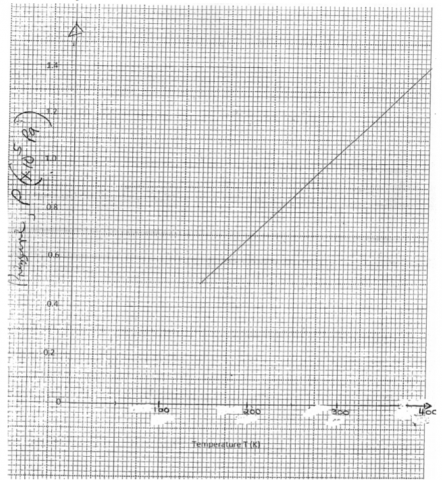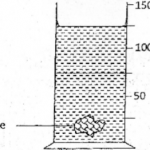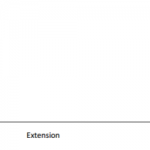KNEC KCSE Physics Paper 2 – 2014 Cross Country Mock
2014 Cross Country Mock
Physics Paper 2
Figure below shows the level of water in a measuring cylinder after a stone of mass x g is immersed in the water. The initial level of the water is shown with a dotted line.
If the density of the stone is 2.008g/cm3 what is the mass of x?
2 marks
The diagram below shows a metal plate 2m x 1m of negligible thickness and mass 1.0kg. A horizontal force F applied at B just makes the plate to tilt. Calculate the value of the force F.
2 marks
The diagram shows parallel forces acting on a body AB. Indicate on the diagram another force to make the resultant force on the body 10N to the right.
1 marks
Figure shows a section through a mug which has the shape of a truncated cone and which is full of liquid.
The area of the base is 0.003m2 and the depth of the liquid is 0.015m. The density of the liquid is
1100Kg/m3. What is the force exerted by the liquid on the base of the mug?
3 marks
A garden sprinkler has small holes each 2.00mm2 in area. If water is supplied at the rate of
3.0 x 10-3m3s-1 and the average velocity of the spray is 10m/s. Calculate the number of the small holes.
2 marks
The diagram below shows the essential features of a solar heating panel. A small electric pump circulates the liquid through the pipes.
State briefly why:
(i) The pipes and metal plates are blackened. (1mk) ………………………………………………………………………………………………………….. …………………………………………………………………………………………………………..
(ii) There is a material fibre glass on the panel. (1mk) ………………………………………………………………………………………………………….. …………………………………………………………………………………………………………..
2 marks
The figure below shows an electric iron.
Two metal plates A and B are riveted to form a bimetal strip as used above.
(i) Which metal expands more (1mk)
………………………………………………………………………………………………………….. …………………………………………………………………………………………………………..
(ii) Explain how the electric iron works when the power is on (2mks) ………………………………………………………………………………………………………….. ………………………………………………………………………………………………………….. ………………………………………………………………………………………………………….. …………………………………………………………………………………………………………..
3 marks
(a) State Hooke’s law (1mk)
………………………………………………………………………………………………………….. ………………………………………………………………………………………………………….. …………………………………………………………………………………………………………..
(b) Five identical spiral springs are arranged as shown below. Each spring weighs 1.0N and each cross bar weighs 2.0N. If the spring system extends by 21.85cm when supporting a load of 100N.
Calculate the spring constant of one spring in S.I. units. (3mks)
4 marks
Four identical bulbs each of resistance 20Ω are arranged in a circuit as shown below. The voltage source is 10V.
Calculate the total electric energy converted to heat energy by the bulbs in one hour and 10 minutes.
3 marks
Given that a material X of density 8.5g/cm3 is attached to a piece of wood of mass 100g and density
0.2g/cm3. Calculate the volume of material X which must be attached to the piece of wood so that the two together just submerge beneath liquid of density 1.2g/cm3.
2 marks
The five-tick tape shown below was produced by a ticker timer connected to mains supply of 50Hz when a force pulls the trolley. Determine the acceleration of the trolley.
2 marks
(a) Distinguish between heat capacity and specific heat capacity. (1mk) ………………………………………………………………………………………………………….. ………………………………………………………………………………………………………….. …………………………………………………………………………………………………………..
(b) (i) Figure below shows a set-up that can be used to determine the specific heat capacity of a metal block
(I) State the measurements that should be taken in the experiment to determine the specific heat capacity of the block. (2mks)
………………………………………………………………………………………………………….. ………………………………………………………………………………………………………….. ………………………………………………………………………………………………………….. …………………………………………………………………………………………………………..
(II) Show how the measurements in (I) above can be used to determine the specific heat capacity of a
metal block. (2mks)
………………………………………………………………………………………………………….. …………………………………………………………………………………………………………..
(III) State the functions of the following in the set-up. (2mks)
Lagging
………………………………………………………………………………………………………….. ………………………………………………………………………………………………………….. …………………………………………………………………………………………………………..
Oil
………………………………………………………………………………………………………….. ………………………………………………………………………………………………………….. …………………………………………………………………………………………………………..
(IV) State one precaution that should be taken. (1mk) ………………………………………………………………………………………………………….. ………………………………………………………………………………………………………….. …………………………………………………………………………………………………………..
(c) A well lagged copper copper can together with a stirrer of total heat capacity 60JK-1 contains 200g
of water at 10oC. Dry steam at 100oC is passed in while the water is stirred until the content reach a
temperature of 40oC. Calculate the mass of condensed steam. (5mks)
13 marks
SECTION B (55 Marks)
Answer all questions.
A man uses a rope to pull a crate of mass 75Kg up an inclined wooden plank of effective length 4.50m and onto a platform 1.50m high at a steady speed. The frictional force between the crate and the plank is 200N and the component of the weight of the crate parallel to the length of the plank is 250N.
Find:
(a) The effort he must exert on the rope (1mk)
(b) The V.R. (2mks)
(c) The mechanical advantage, M.A. (2mks)
(d) The energy wasted in pulling the crate to the platform. (2mks)
(e) Given that the normal reaction N = mg cosθ where θ is the angle of the plane with the horizontal.
Calculate the co-efficient of friction between the crate and the plane. (3mks)
10 marks
(a) A bob having a mass of 1.0Kg is moving in uniform circular path in a vertical plane having a radius
of 1.0m. If it is whirled with a frequency of 2 cycles per second, calculate;
(i) The tension in the supporting string when the bob is at the top most part of the circle. (2mks)
(ii) The tension when the bob is at the bottom of the circle. (2mks)
(iii) At what position of the bob is the string likely to break? (1mk)
(b) A steel ball is dropped into a cylinder containing oil. Sketch a graph showing the variation of:
(i) Velocity with time during the fall. (1mk)
(ii) Displacement with time during the fall. (1mk)
(iii) Acceleration with time of the ball during the fall (2mks)
(c) State the forces acting on the ball as it moves through the oil. (1mk) ………………………………………………………………………………………………………….. ………………………………………………………………………………………………………….. …………………………………………………………………………………………………………..
10 marks
(a) State the pressure law. (1mk)
………………………………………………………………………………………………………….. ………………………………………………………………………………………………………….. …………………………………………………………………………………………………………..
(b) A student investigated the relationship between the pressure and temperature of a fixed mass of a gas using the apparatus as shown below.
The set up is heated continuously with a Bunsen burner and the reading of pressure and temperature
recorded after every minute.
(i) State one way in which this experiment may be improved. (1mk) ………………………………………………………………………………………………….. …………………………………………………………………………………………………..
(ii) The graph shows the relationship between pressure and temperature for the above
(I) From the graph, determine the pressure at a temperature of 273K. (1mk)
(II) Determine the slope of the graph. (2mks)
(III) Describe what happens to the gas molecules as the gas is cooled. Indicate how this
result in reduction in pressure. (2mks)
………………………………………………………………………………………….. ………………………………………………………………………………………….. ………………………………………………………………………………………….. …………………………………………………………………………………………..
(c) The volume and pressure of hydrogen at 15oC are 336cm3 and 756mmHg respectively. Determine
the volume of hydrogen at standard temperature and pressure (s.t.p) (At s.t.p, temperature = 0oC,
pressure = 760mmHg). (2mks)
9 marks
You are provided with the following:
- Oil
- 1cm3 graduate pipette
- Water
- Level tary
- Two wax-coated rods
- Lycopodium powder
- Metre rule
(a) Using the apparatus listed above, describe how you would carry out an experiment to determine the size of oil molecule. (5mks)
………………………………………………………………………………………………………….. ………………………………………………………………………………………………………….. ………………………………………………………………………………………………………….. ………………………………………………………………………………………………………….. ………………………………………………………………………………………………………….. ………………………………………………………………………………………………………….. ………………………………………………………………………………………………………….. ………………………………………………………………………………………………………….. ………………………………………………………………………………………………………….. …………………………………………………………………………………………………………..
(b) What is the purpose of the lycopodium powder? (1mk) ………………………………………………………………………………………………………….. ………………………………………………………………………………………………………….. …………………………………………………………………………………………………………..
(c) Why does the drop of oil spread out into a patch? (2mks) ………………………………………………………………………………………………………….. ………………………………………………………………………………………………………….. ………………………………………………………………………………………………………….. …………………………………………………………………………………………………………..
(d) In an oil drop experiment, it was found that one oil drop spread on water to form a patch of diameter 0.8cm and thickness 2.0 x 10-6mm. Calculate the radius of the drop. (3mks)
11 marks
